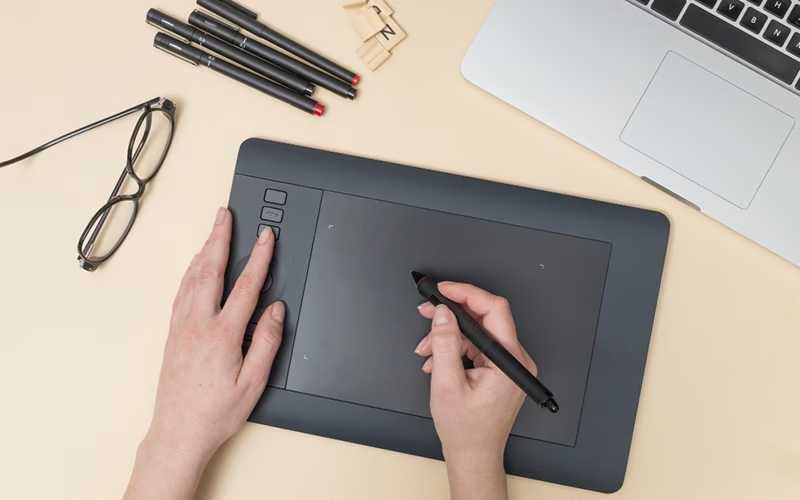As a professional graphic designer, I know how crucial it is to have the right tool to bring our digital creations to life. For years, I’ve tested different graphics tablets, and I assure you that choosing the right one can make the difference between good work and exceptional work.
In this guide, I want to share my experience and knowledge to help you find the perfect tablet to suit your creative needs. I will not only present you with the three best options on the market, but also explain why they stand out and how they can enhance your work.
Best of all? I’ve done all the research for you. I’ve analyzed technical specifications, read hundreds of reviews, and most importantly, I’ve personally tested these devices on real projects. My goal is simple: save you time and money, helping you make an informed decision that will boost your creative career.
Key Factors to Consider for Your Next Graphics Tablet
Before diving into specific recommendations, let me share the crucial factors you should consider to make a wise choice:
Pressure Sensitivity
Undoubtedly, this is one of the most important aspects for any digital artist. A good tablet should offer at least 8192 pressure levels. Why? Because this will allow you to have precise control over the thickness and opacity of your strokes, just as if you were working with traditional materials.
Active Work Area
Size matters, and a lot. In my experience, a tablet with an active area of at least 10 inches is ideal for professional work. Think about this: the larger the work area, the more natural and precise your movements will be, especially in projects requiring fine details.
Screen Resolution
If you opt for a tablet with a screen, resolution is crucial. I recommend looking for at least 2K resolution (2560 x 1440 pixels). Vibrant colors and sharp details are essential to ensure that what you see is exactly what you’ll get in the final result.
Response Time
Have you ever experienced that annoying delay between your stroke and its appearance on the screen? A response time of less than 20ms is essential for a smooth and natural experience. This makes the difference between feeling limited by your tool or feeling that it’s a natural extension of your hand.
Software Compatibility
Not all tablets are compatible with all programs. Make sure your choice works perfectly with your favorite software, whether it’s Photoshop, Illustrator, Clip Studio Paint, or any other. Compatibility with different operating systems is also crucial if you work on multiple devices.
Pen Features
The pen is your inseparable companion in digital design. Look for one that offers:
- Tilt recognition for more natural strokes
- Integrated eraser function
- No battery required (EMR technology)
- Ergonomic grip for long work sessions
Connectivity and Portability
In today’s world, mobility is key. Consider if you need a tablet that:
- Works wirelessly
- Is light enough to take to client meetings
- Has good battery life (minimum 6 hours of continuous use)
Budget and Warranty
Finally, but no less important, define your budget, keeping in mind that a professional graphics tablet is a long-term investment. Look for options that offer a good warranty and reliable technical support.
The 3 Best Professional Graphics Tablets of 2025
1. Wacom Cintiq Pro 27
The undisputed queen of professional design. With this tablet, I’ve created some of my best work, and here’s why I love it:
Key Features:
- 27-inch QHD (2560 x 1440) screen with 99% Adobe RGB
- 8,192 pressure levels with ProPen 3 technology
- Ultra-fast 8ms response time
- 10 customizable Express Keys
- Integrated adjustable tilt support
Advantages:
- Exceptional color quality for precision work
- Incredibly natural drawing experience
- Matte anti-reflective screen that simulates the texture of paper
- Robust and durable construction
- Compatible with virtually all professional software
Disadvantages:
- High price ($3,299)
- Requires considerable workspace
- Needs to be plugged in
2. XP-PEN Artist Pro 16 (2025 Edition)
My favorite option for balancing quality and price. This tablet is a true gem for professionals seeking excellence without breaking the bank:
Key Features:
- 15.6-inch IPS screen with 4K resolution
- 8,192 pressure levels
- 8 customizable Express Keys
- Battery-free X3 Pro pen
- Full lamination technology
Advantages:
- Excellent value for money ($899)
- Vibrant and precise colors
- Very portable and lightweight
- Includes adjustable stand
- Great compatibility with professional software
Disadvantages:
- The work area might be small for some
- Drivers need occasional updates
- Warranty is more limited than Wacom’s
3. Samsung Galaxy Tab S9 Ultra
For those seeking absolute versatility, this hybrid tablet has revolutionized my mobile workflow:
Key Features:
- 14.6-inch AMOLED screen with 120Hz refresh rate
- Included S Pen with ultra-low latency
- Snapdragon 8 Gen 2 processor
- Long-lasting battery (up to 12 hours)
- Android operating system with DeX mode
Advantages:
- Perfect for mobile work
- Works as a standalone tablet
- Extremely precise S Pen
- Excellent for digital illustration and design
- Can run professional Android apps
Disadvantages:
- Considerable price ($1,199)
- Less pen pressure (4,096 levels)
- Not a dedicated design solution only
Price Comparison:
| Wacom Cintiq Pro 27 | $3,299 |
| XP-PEN Artist Pro 16 | $899 |
| Samsung Galaxy Tab S9 Ultra | $1,199 |
Choosing the Best Graphics Tablet
After this tour of the best graphics tablets on the market, I want to help you make the most informed decision for your specific case. Here’s a summary of the most important points to consider:
Key Points to Remember
The perfect choice will primarily depend on three factors: your experience level, the type of projects you undertake, and, of course, your budget. Don’t forget to consider pressure sensitivity, work area, and screen quality as fundamental technical aspects.
My Final Recommendation
If you are an established professional or a design studio looking for the best of the best, the Wacom Cintiq Pro 27 is your best bet. Yes, it’s a considerable investment, but its quality and durability make it the most cost-effective in the long run.
For freelance designers or small studios looking for a balance between quality and price, the XP-PEN Artist Pro 16 is your best option. It offers professional features at a more accessible price, without significantly compromising quality.
And if mobility is your priority, or if you need a versatile solution that you can use for design as well as other tasks, the Samsung Galaxy Tab S9 Ultra is your ideal companion. It’s perfect for those who work in different locations or need to present their work to clients on the go.
Remember, the best tablet isn’t necessarily the most expensive, but the one that best suits your workflow and specific needs. My advice is to consider this purchase as an investment in your professional career and choose the option that allows you to create without limitations.

